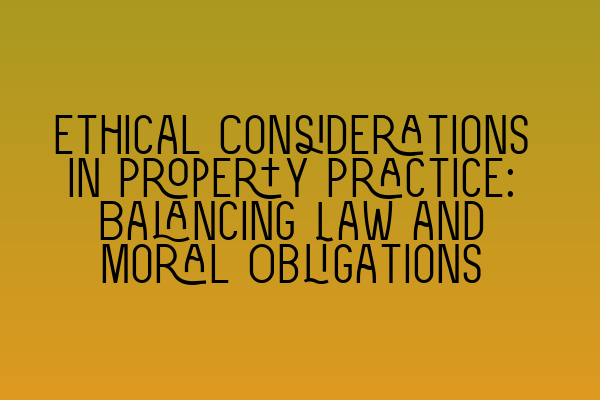Ethical Considerations in Property Practice: Balancing Law and Moral Obligations
As property solicitors, we are often faced with complex legal scenarios that require us to navigate through the intricate web of property law. However, in the pursuit of upholding the law, it is vital for us to also consider the ethical implications of our actions.
In this blog post, we will delve into the ethical considerations that property practitioners must bear in mind and explore the ways in which we can strike a balance between legal obligations and moral values.
The Importance of Ethics in Property Practice
Property practice involves dealing with real estate transactions, landlord-tenant relationships, and various other legal issues concerning properties. While our primary duty as solicitors is to our clients and upholding the law, we must not overlook the ethical dimension of our work.
Ethics in property practice ensure that our actions align with values such as honesty, integrity, and fairness. By adhering to ethical standards, we can build trust with our clients, maintain a positive reputation, and contribute to a just and equitable society.
Transparency and Communication
One ethical consideration that should be at the forefront of our minds is the need for transparency and clear communication with our clients. Providing accurate information about the legal aspects of a property transaction, including risks and potential issues, is essential for informed decision-making.
By being transparent, we can ensure that our clients understand the implications of their actions and help them make informed choices. This transparency also extends to our interactions with counterparties, ensuring fairness in negotiations and avoiding any ethical gray areas.
Respecting Client Confidentiality
Confidentiality is a cornerstone of the solicitor-client relationship. It is crucial that we maintain the highest level of confidentiality in all our dealings and safeguard our clients’ sensitive information.
Respecting client confidentiality not only upholds our ethical obligations but also fosters trust between solicitors and clients. It is through this trust that clients can feel secure and confident in sharing the necessary information to effectively handle their property matters.
Avoiding Conflicts of Interest
Conflicts of interest can arise in property practice when we find ourselves torn between our duty to our clients and a personal or professional interest. It is vital that we identify and manage these conflicts ethically to protect the best interests of our clients.
By establishing clear policies and processes to identify and address conflicts of interest, we can ensure that our clients receive unbiased and diligent representation. This ethical approach helps to prevent any harm to our clients and potential damage to our professional reputation.
Environmental Considerations
In recent years, there has been a growing awareness of the environmental impact of property transactions. As property practitioners, it is our duty to consider the environmental consequences of our clients’ actions and advocate for sustainable practices.
By including environmental considerations in our advice and encouraging clients to adopt environmentally responsible practices, we contribute to the greater good and align our work with ethical and moral obligations. This approach also reflects the evolving expectations of clients and society as a whole.
Conclusion
As property solicitors, we must remember that our responsibilities extend beyond the boundaries of the law. Ethical considerations play a significant role in guiding our actions and ensuring that we uphold moral principles alongside our legal obligations.
The integration of transparency, clear communication, respect for client confidentiality, management of conflicts of interest, and environmental considerations into our property practice allows us to strike a balance between our legal duties and our ethical responsibilities.
By adhering to ethical standards, we not only enhance our professional reputation but also contribute to a just and equitable society. Ultimately, it is the harmonious integration of law and moral obligations that defines responsible and ethical property practice.
Related Articles:
- Misrepresentation in Contracts: Unveiling Deceptive Practices
- A Closer Look at SQE Contract Law Syllabus
- SQE Contract Law: Analyzing Landmark Cases and Influential Judicial Decisions
- Understanding Contractual Capacity: Rights and Limitations
- Interactive SQE Mock Tests for Contract Law: Test Your Knowledge
